"A physical picture book is an opportunity for a parent and child to make a connection," said children's book author and illustrator John Rocco during the Children's Publishing Conference held just before BookExpo America, organized by Publishing Perspectives, co-hosted by Scholastic and entitled "What Makes a Children's Book Great?"
Now e-picture books have the potential to make the same parent-child connection, especially as they expand into the digital marketplace, a phenomenon that until relatively recently was inconceivable.
"We're the only game in town," declared Kevin O'Connor, head of business development and publishing relations for Barnes & Noble's Nook Kids. O'Connor, who gave a brief presentation regarding the Nook Kids platform, identified interactivity and functionality, including animations and sound effects, as key factors to the success of digital picture books.
Despite the growth in sales of digital picture books and other children's books, physical sales remain strong. Several speakers, including Roger Sutton, editor-in-chief of the Horn Book, and author/illustrator Peter Brown, touted the emotional significance of print books. Said Sutton: "People treasure the physical experience of reading with a child.... It keeps picture books safe."
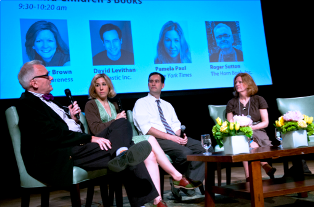 |
| Roger Sutton, Pamela Paul, David Levithan and Shelf Awareness children's editor Jennifer Brown, moderator. |
Sales of YA books, meanwhile, have been much greater than children's books. Both Pamela Paul, children's book editor for the New York Times Book Review, and author and publisher David Levithan spoke of the widespread presence of YA authors on social media networks and in the blogosphere. But speakers expressed a range of opinions on the usefulness of social networks and blogs to YA and children's book authors.
Levithan described the online interactions of bloggers, authors and teenage fans as the "amazing street team" of YA publicity. Graphic novelist Raina Telgemeier was a staunch supporter of social networks and blogs, saying, "[Give] them a little piece of yourself, then the books will follow." "Connect [with your audience] before you start to write the book," added YA author Beth Kephart. "Work to create a personal and authentic relationship." On the other hand, Peter Brown described librarians as the people who "really put books in kids' hands."
Panelists also discussed the ongoing trend of adult readers flocking to YA titles. Pamela Paul posited that this could be a result of YA's tendency to focus on plot- and character-driven storytelling, as opposed to the interior focus and psychology found in much adult fiction. By contrast, David Levithan maintained that this trend simply "illuminates the bulls**t distinction" between YA and adult fiction.
Several speakers, including Scholastic president and CEO Richard Robinson, touched on how quality control remains paramount in children's publishing, contributing to its relative stability and endurance. Robinson warned, however, that as children's publishing pushes further and further into the digital marketplace and the availability of children's books greatly increases, the challenge will become maintaining that quality.
One explanation for the consistent level of quality found in children's publishing is the relative lack of self-publishing. While there may be some real gems among self-published books, they are rare, was the consensus of the speakers. Rosemary Stimola, founder and president of the Stimola Literary Studio, described the problem of self-publishing as one of quality control, creating "a sea of un-juried, un-vetted and unedited work... another form of slush pile."
The two other literary agents, Erica Rand Silverman of Sterling Lord Literistic, and Ken Wright of Writers House, identified a "growing impatience" by authors, who turn to self-publishing sometimes too soon. Stimola asserted that the blame rests not solely on authors but also on publishers and editors, who sometimes put too much emphasis on finding the next hit or blockbuster.
Fittingly, the last topic of the day perhaps answered the conference's titular question: What makes a children's book great? Peter Brown said, "If I read a story and relate to it, if it lingers in my imagination, then it's a great book." --Alex Mutter
photo: Publishing Perspectives
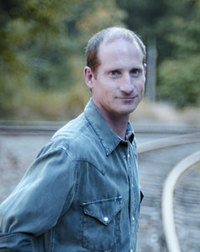 "At home here in Washington State, I continue to relish the Seattle Arts and Lecture series inside the same grand Benaroya Hall where the symphony performs and Pearl Jam cut a live album. For me, it really doesn't even matter who the author is. What inspires me is the crowd, that up to 2,000 people come out to hear prominent and promising authors. There are some belly laughs and standing ovations, but mostly there's the gentle hum and murmur of the stimulated minds of intense readers coming together to listen to and think about words. In these days of electronic mania and shrinking attention spans, just being there can make you feel like you are part of some intelligent and subversive cult."
"At home here in Washington State, I continue to relish the Seattle Arts and Lecture series inside the same grand Benaroya Hall where the symphony performs and Pearl Jam cut a live album. For me, it really doesn't even matter who the author is. What inspires me is the crowd, that up to 2,000 people come out to hear prominent and promising authors. There are some belly laughs and standing ovations, but mostly there's the gentle hum and murmur of the stimulated minds of intense readers coming together to listen to and think about words. In these days of electronic mania and shrinking attention spans, just being there can make you feel like you are part of some intelligent and subversive cult."







 The Associated Press (via the Star-Tribune) surveyed
The Associated Press (via the Star-Tribune) surveyed 
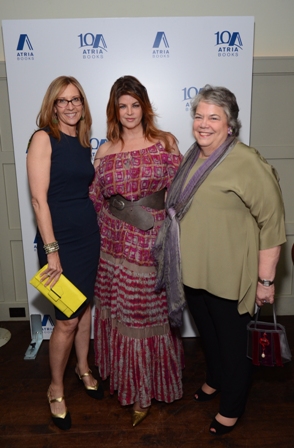 Atria Books celebrated 10 years of publishing with a dinner at the Soho House last Wednesday evening. Among those in attendance were Kirstie Alley (The Art of Men, November 2012), Spencer Quinn (A Fistful of Collars, September 2012), Joseph Kanon (Istanbul Passage), M.J. Rose (The Book of Lost Fragrances), Zane (Z Rated), Brad Thor (Black List, July 2012) and Jennifer Weiner (The Next Best Thing, July 2012). Atria also celebrated its 234th bestseller in 10 years, as Kanon's book hit the New York Times list. Here are (from l.) Atria publisher Judith Curr, Kirstie Alley and Simon & Schuster CEO Carolyn Reidy.
Atria Books celebrated 10 years of publishing with a dinner at the Soho House last Wednesday evening. Among those in attendance were Kirstie Alley (The Art of Men, November 2012), Spencer Quinn (A Fistful of Collars, September 2012), Joseph Kanon (Istanbul Passage), M.J. Rose (The Book of Lost Fragrances), Zane (Z Rated), Brad Thor (Black List, July 2012) and Jennifer Weiner (The Next Best Thing, July 2012). Atria also celebrated its 234th bestseller in 10 years, as Kanon's book hit the New York Times list. Here are (from l.) Atria publisher Judith Curr, Kirstie Alley and Simon & Schuster CEO Carolyn Reidy.
 The
The 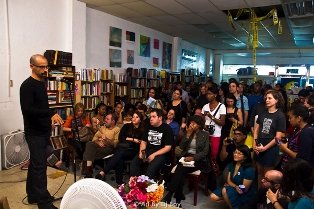 The 10-day fundraising period began last Thursday and includes
The 10-day fundraising period began last Thursday and includes 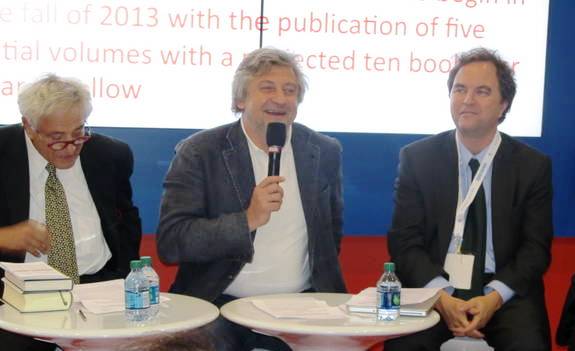 The Russian Library was announced during BookExpo America by Peter Mayer, Overlook's president and publisher; Vladimir Grigoriev, deputy director of the Russian Federal Agency for Press and Mass Communication; and Peter Kaufman, executive director of Read Russia. The Russian Library initiative will be funded through Read Russia, the sponsor of
The Russian Library was announced during BookExpo America by Peter Mayer, Overlook's president and publisher; Vladimir Grigoriev, deputy director of the Russian Federal Agency for Press and Mass Communication; and Peter Kaufman, executive director of Read Russia. The Russian Library initiative will be funded through Read Russia, the sponsor of 
 Earlier this month,
Earlier this month, 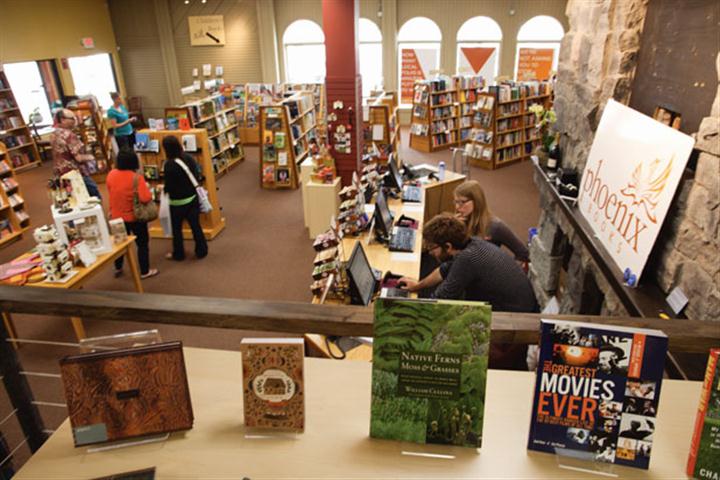 The new branch of
The new branch of  "We got a call that Wednesday night saying it was looking good for us," said Shannon Piserchio, who owns the bookshop with her husband, Gary. "We were notified the next morning that we were the one and that it would happen at 2:30. We helped get the word out on our Facebook page."
"We got a call that Wednesday night saying it was looking good for us," said Shannon Piserchio, who owns the bookshop with her husband, Gary. "We were notified the next morning that we were the one and that it would happen at 2:30. We helped get the word out on our Facebook page." Travel news journalist Peter Greenberg featured a slide show with his choices for the "
Travel news journalist Peter Greenberg featured a slide show with his choices for the "